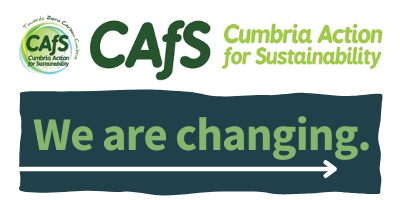The Zero Carbon Cumbria Partnership is working towards making Cumbria the first net zero carbon county in the UK, by 2037.
It’s an ambitious and inspiring challenge that will touch on many aspects of life in Cumbria to bring down the county’s greenhouse gas emissions to net zero. One part of this work is an exciting five-year programme of community activity to help people reduce their carbon footprint, particularly from food, waste and the goods we buy. It’s all been made possible thanks to a £2.5 million grant from the National Lottery Climate Action Fund.
The partnership brings together 80 organisations spanning the public, private and third sectors, with the aim of cutting greenhouse gas emissions – the root cause of the climate crisis. Members include community groups, local authorities, the NHS, police, national parks, businesses and the farming community, among others. The partnership is jointly chaired by CAfS and the University of Cumbria with CAfS having put together the successful funding bid to The National Lottery on its behalf.
This major programme, developed and led by communities, marks a step change in the scale of activity in Cumbria to cut greenhouse gas emissions, which are the main cause of climate change. Never before have so many of the county’s most influential organisations come together with the determination to do this – organisations with the power and influence to make real change happen – from community activities to the policies that shape local life.
The programme of action will reduce the county’s emissions in a way that benefits communities, through action led by them and directed by sector groups. The four sector groups are: farming and land use, waste and the circular economy, buildings, and, transport and mobility. You can read more about them, their emission scopes and who is involved on the Zero Carbon Cumbria website.
It’s hoped that the impact of the programme will be felt beyond Cumbria, too. The partnership aims to show what can be achieved when such a broad range of orgnisations and communities work together to reduce emissions.



